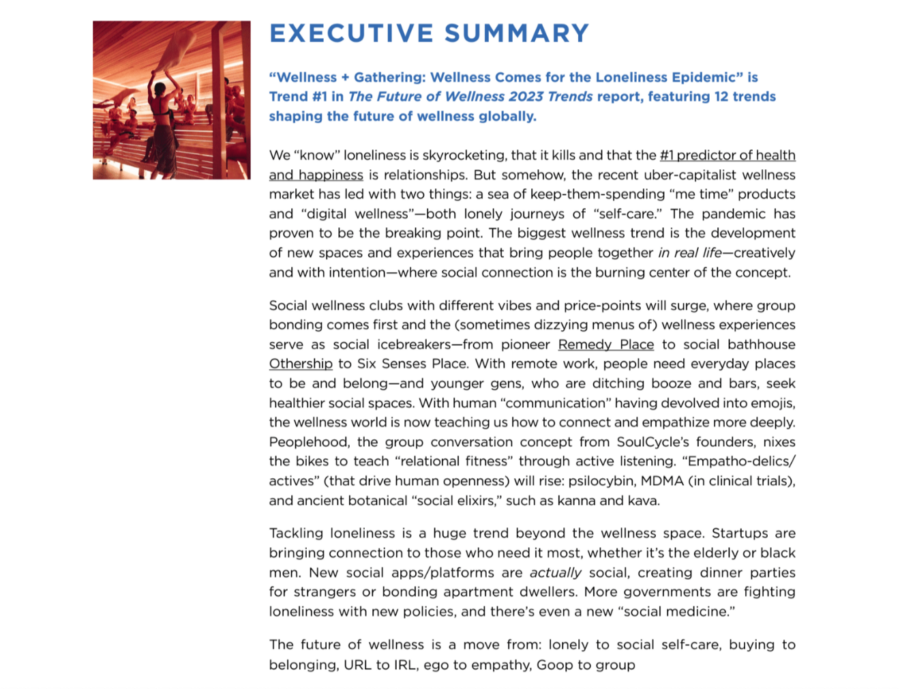
Trend: Saunas and Social Connection
Whether it’s a NYC urban bathhouse becoming a “hot new party place,” an outdoor sauna on a UK beach being dubbed the “new pub,” or bathhouses in China fully decked out with cinemas, mahjong areas, and karaoke, saunas are becoming the new social wellness hubs.
Social saunas and bathhouses are fast emerging as a remedy to some key issues: the loneliness and mental health crises; young generations seeking alcohol-free, healthier social experiences; and the need, in an era of so much “wealthy wellness,” for far more affordable, accessible experiences. These new “third spaces” provide a healthy and safe environment for connecting with like-minded people. With the US surgeon general, Vivek Murthy, coming out just this week with a wave a proposals to expand protections for children on social media – an aspect of modern life that is linked to a greater risk of anxiety, depression and even body image disorders especially in young people, these new wellness hubs, which force guests to put down their phones, provide a much-needed space for authentic social interactions. And they are popping up just about everywhere.
There’s really nothing new here: saunas and bathhouses have long served as the center of communities in Europe and Asia. For centuries, these spaces have been cherished for their cleansing rituals, therapeutic benefits, and social interactions. Similar to places of worship, saunas and bathhouses provided a gathering place for people to come together, unwind, and share stories. Particularly for women, who were often limited in their social opportunities, these communal spaces offered a rare chance to connect with others outside the confines of their homes.
Today, with church attendance on the decline and pubs and bars less popular with younger generations and those looking for healthy alternatives, sauna and bathhouse operators are making conscious efforts to build communities. “There is a resurgence of sauna as community spaces,” Mika Meskanen, chair of the British Sauna Society, said in The Guardian. “The Roman baths in ancient Britain had that social function – meeting places, places for getting healthy and doing exercise. I call them friend-making boxes – people go in, they might not know each other, but they come out as friends.”
Communal bathing experiences can range from the simple—like a rustic sauna situated lakeside, where you can do some contrast bathing with a cold plunge in natural waters—to the complex and sophisticated. New urban bathhouses are popping up in cities across the globe often boasting an array of facilities (multiple saunas, steam rooms, snow rooms, and pools) and with a wide array of wellness experiences that serve as social icebreakers. These can range from breathwork and guided meditation to stretch classes and live musical performances, and more are including sauna aufguss rituals led by skilled sauna masters, creating a truly immersive and theatrical communal experience.
There are so many new global examples. In New York, Bathhouse and Othership just opened, and both offer huge event saunas, cold plunges or ice baths, and are creating passionate communities. In China, bathing centers throughout the country are experiencing a resurgence among locals and tourists. Cultural sociologist, Xu Shuming, told the Global Times that “the growing popularity of public baths reveals how the concept of ‘bath’ has transformed from a ‘domestic behavior’ to a ‘social event’ fostering emotional bonds. In Australia a new social bathhouse opened in Sydney’s Bondi Junction offering unlimited access to ice baths, a steam room and multiple saunas for just AUD$28 per week.
What all of these spaces have in common is that, at their core, they are striving to be far more democratic and affordable alternatives for people who are looking for ways to connect (without the hangover or the cell phone in their hands). Unlike exclusive day spas or high-priced longevity clinics, these venues offer social-sweat sessions at an affordable rate, typically around $35–so people can prioritize their mental and physical health without breaking the bank.
The positive impact of sauna usage on mental health is a topic of growing interest and research. A recent article in Wired Magazine, “Saunas Are the Next Frontier in Fighting Depression,” explored the preliminary results of a small clinical trial using heat exposure to combat depression, noting that “heat therapy may be more accessible to people than pharmaceuticals, talk therapy or vigorous workouts.” Additionally, a new study published in the Journal of Psychiatric Research revealed a correlation between frequent sauna use and a lowered risk of developing psychosis.
“Wellness Comes for the Loneliness Epidemic” was one of our top 2023 trends, where we noted that relationships are the #1 predictor of health and happiness and that the “biggest wellness trend will be the development of new spaces and experiences that bring people together.” The social sauna surge is gaining momentum at a critical time when the need for human connection has never been more pronounced.

Discover the 10 Trends Shaking Up the Wellness Industry in 2024 Here
The TRENDIUM is a compendium of the latest trends impacting the
multi-trillion dollar global wellness economy.
Sign-up for monthly TRENDIUM emails.